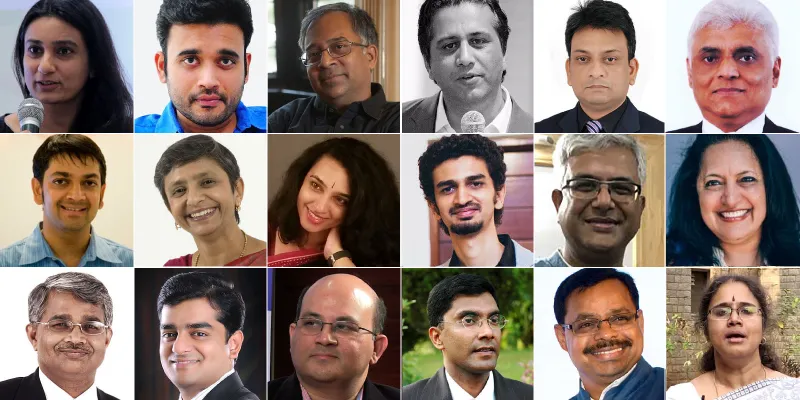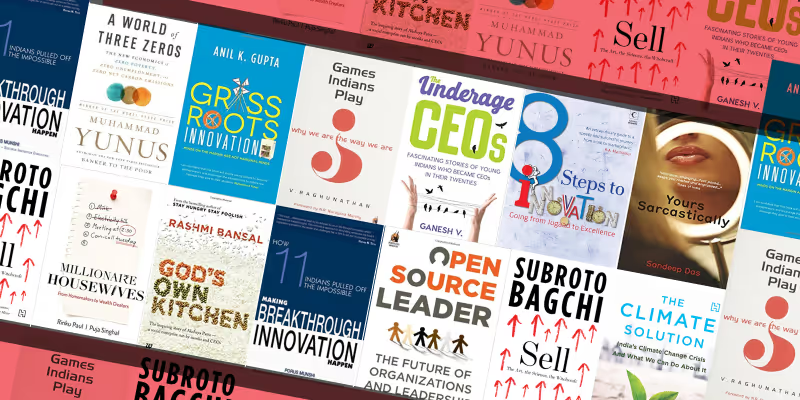‘The first big shift in India’s startup wave is bold ambition’ – meet the authors and founders at Bangalore Business LitFest 2018
The fourth annual Bangalore Business Literature Festival (BBLF) will be held at WeWork Galaxy on September 8, and will feature a range of insights on the future of work, AI, climate change, learning tools, and entrepreneurship.

Business literature can be engaging and fun. “This year we examine themes like AI and go beyond the current scare that automation is spreading. New opportunities can be imagined and built,” said Benedict Paramanand, CEO, Bangalore Business Literature Festival (BBLF), and publisher of Management Next magazine, in a chat with YourStory (see Part II of our article here).
Over the previous three editions, BBLF has hosted more than 50 authors from across the country. See my write-ups on the earlier editions of the festival in 2017 (entrepreneurship, failure insights, founder stories), 2016 (grassroots entrepreneurship, startup ecosystems) and 2015 (business models, startup boom, and storytelling).
BBLF 2018 features 18 entrepreneurs and corporate heads in the speaker lineup, as well as authors such as V Raghunathan (Games Indians Play), Rishikesha Krishnan (8 Steps to Innovation), Sangeeth Varghese (Open Source Leader), Mridula Ramesh (The Climate Action), Sandeep Das (Yours Sarcastically), and Ganesh Vancheeswaran (The Underage CEO). In a series of articles, we will share insights from the speakers and discussions at the festival.
India’s startup boom
One of the major stories of the decade has been the rise of the entrepreneurship movement in India. “The first big shift in the startup wave is the bold ambition,” said Dr. Ashwin Naik, Founder, Vaatsalya Healthcare, and an Ashoka Fellow.
“What we have seen in the last few years is the sheer opening of minds and spirits because of leaders like Flipkart, Paytm, and the like. It’s no longer about building the largest business in India, but really playing on global scale. I think we will see much bigger companies built in the next decade,” Ashwin predicted.
However, the startup journey is full of ups and downs, and failures need to be acknowledged along with the successes. “One big challenge that I see is that history is defined by the winners. And while there is growing literature about success, failure is less documented, and less sexy,” he cautioned.
“We need to not only celebrate but also document failures and their learnings. Industry and academia could play a great role in this by working together. Failure should be analysed as a normal process of startups, and not of a person,” Ashwin added.
The role of storytelling
“Human beings are social, and stories create social bonding across different contexts. A message well told is always a story,” explained Professor Vasanthi Srinivasan, IIM Bangalore. “Stories create discontinuity, they engage the listener; they help the listener make sense of the phenomena not just for themselves but through the eyes of the narrator. This natural empathy that arises between the storyteller and the audience is the essence of leadership as followership,” she added.
She urged leaders to be storytellers within organisations to build vision, to create purpose, and to shape hearts, heads, and minds of employees. “Storytelling is not needed to budget, forecast, and plan,” she said.
Business impact for several years has been conceived to be a linear, logical phenomenon with causes, results, consequences, and impacts, dominated by short-term success. “Yet, the largest corporations that have lived through recession and wars have great stories to narrate about changed products, nature of business, and business models,” Vasanthi said.
Innovating for India
Productivity and innovation hold the key to a better future for India. “One of the key challenges from a societal perspective is to build a culture of innovation to solve real ‘India’ problems at scale,” Aswhin explained. Entrepreneurs should also think long term, with plans for the next 10 to 20 years.
In this regard, he cites some of his favourite books: Making Breakthrough Innovation Happen: How 11 Indians Pulled off the Impossible (Porus Munshi), I too had a dream (Varghese Kurian), and World Class in India: A Casebook of Companies in Transformation (Gita Piramal and Sumantra Ghoshal).
Innovation at scale requires bold thinking, unparalleled ambition, and long-time horizons. “Most of these are non-VC fundable tracks,” Ashwin said. Innovators should also learn how to work with governments. “I would like to see more startups work with governments to solve problems that are deep rooted in India, and do it at scale,” he added.
Book award
This year, BBLF presents the CK Prahalad Best Business Book Award to Subroto Bagchi, Co-founder of MindTree, for his book Sell: The Art, the Science, the Witchcraft (see our book review here).
“CK Prahalad has been one of the most important influencers in my life. It feels he is there in person for me today,” Subroto Bagchi said. (See our review of the book C.K. Prahalad: The Mind of the Futurist here, and a compilation of 35 inspiring quotes by this late great business guru.)
Close contenders for the book award this year were Rashmi Bansal’s God's Own Kitchen: The Inspiring Story of Akshaya Patra, and Rinku Paul and Puja Singhal’s Millionaire Housewives: From Homemakers to Wealth Creators. The award jury members are brand specialist Harish Bijoor, R Sriram (Crossword Founder), and Priya Chetty-Rajagopal (CXO search consultant).

The digital future
Tech trends such as the rise of automation and AI are some of the topics that will be discussed at BBLF 2018. “Technology is providing opportunities for people to connect and I would never have thought how incredible this is for people with talent but no opportunities,” Vasanthi said.
One of her relatives who excelled at handmade dolls now earns money making dolls at home and selling them online. “She can invest for her children's future just because of technology. She has people asking for these hand-made products from all over the world through WhatsApp,” Vasanthi said.
Secondly, technology is helping people seek information that they earlier they sought from older people. Thirdly, it makes it possible for people to hold flexi careers and choose more meaningful ways to live their lives, Vasanthi added.
“Finally, technology is asking humans to rethink their roles in organisations. In particular, what should they not be doing so they can do something else that technology cannot? It is this power of technology that is hitherto unexplored,” Vasanthi said.
BBLF 2018 will also feature workshops on three topics: How to write and publish business books, How to seamlessly transition to a second career, and How to become an Intrapreneur and enjoy your job.







